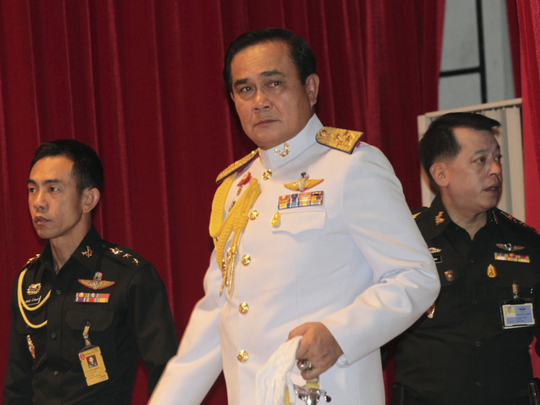
Three years ago, on May 22, 2014, members of the Thai parliament gathered to find a solution to the country’s political crisis. But the politicians were swiftly captured by the army and sent to military camps. Thailand’s democratically elected government was overthrown in a military coup and the coup leader, General Prayut Chan-o-cha, declared that military rule was necessary to put a lid on escalating political turmoil before it boiled over. He had promised that it would be brief, just enough to ensure stability and order. “We will return to you your happiness,” the general said, and citizens would be able to carry on with their lives as normal.
It has been three years now. Thailand is still ruled by the military junta.
Pipop Udomittipong, a pro-democracy social critic and activist, says his life has not returned to normal. Udomittipong says he is constantly on the edge, self-censoring everything he writes, aware that it could very easily land him in jail. As a pro-democracy activist, he has been closely monitored. He says he is on a watch list and is visited by police, military and security officers.
But that is not his biggest concern.
Elections have been repeatedly postponed since the military assumed power, and he fears democracy may never be restored. Political uncertainty has greatly impacted the country’s economy. The Bank of Thailand reported that foreign direct investment fell by more than 90 per cent in the first half of 2016 — reaching the lowest level in more than a decade, at $347 million (Dh1.27 billion).
Some Thais had initially welcomed the coup, believing corrupt politicians had caused chaos and had to be removed from government. Veera Somkwamkid, a long-time anti-corruption activist, shared that belief. But now he says the junta leaders face similar allegations. “The people see many accusations of corruption levelled against those close to Prime Minister General Prayut, and they remain unresolved,” he said.
After three years, Somkwamkid has not seen any shift towards a cleaner government. Instead, his activities as a whistleblower and anti-corruption advocate have been barred. And — like hundreds of others — he is sometimes detained. His house is under surveillance and army officers stand guard in his neighbourhood. Hundreds of critics like Somkwamkid have been imprisoned, and many are issued compulsory summonses to attend so-called attitude readjustment sessions at military camps.
Critics live in fear: Speaking up against the government can lead to charges of sedition, says Noppol Atchamart, of Thai Lawyers for Human Rights. “The law should be used to protect the state’s security, not against individuals,” he argues.
New laws have given the ruling junta wide-reaching powers. Thailand’s new Computer-Related Crime Act restricts free speech, permits surveillance and censorship and retaliation against activists. And the country now also has some of the strictest “lese-majeste” (crime committed against a sovereign power) legislation in the world, threatening 15 years of imprisonment for anyone who insults the royal family. “Before the coup, there were just six or seven people imprisoned under the lese-majeste law,” Atchamart says. “Now there are more than 100, as far as I know, and there could be more. The law is being used broadly and for any kind of offence.
When they took power, junta leaders pledged to bring back democracy in three phases: National reconciliation, comprehensive legal reforms and reinvigoration of democratic institutions. But so far, there has been little evidence of this.
Chan-o-cha has denied the charges levelled by international human rights groups and internal critics. A general election has been promised for next year, but many feel it is unlikely to happen and see little hope of change in the near future.
— Worldcrunch, 2017, in partnership with KBR Asia Calling/New York Times News Service.









